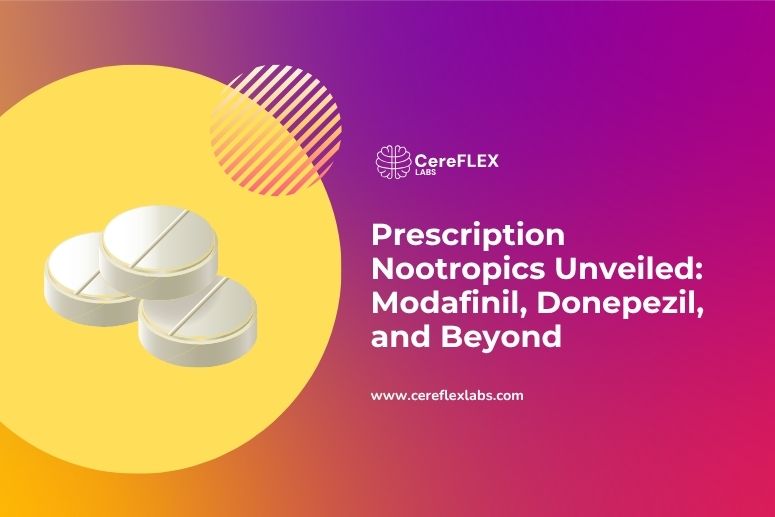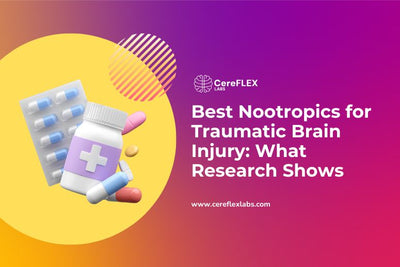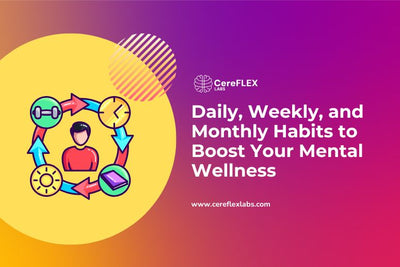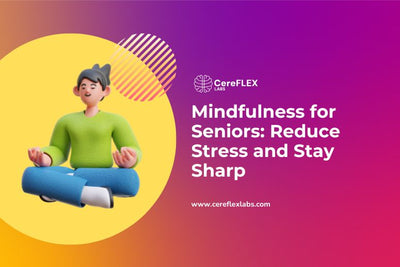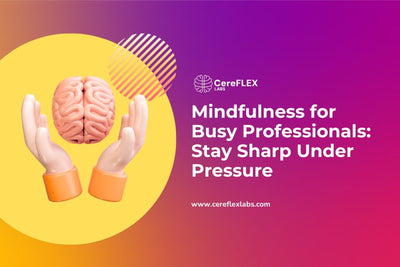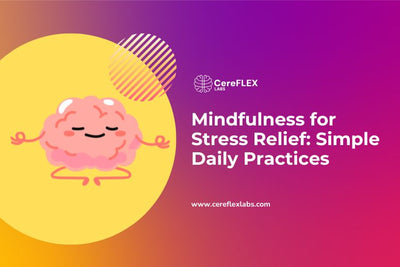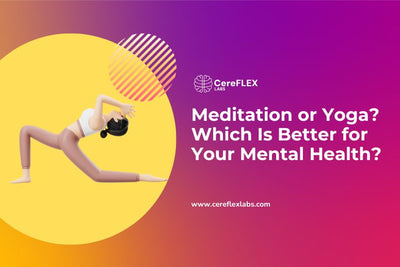In the pursuit of sharper thinking and sustained energy, a growing number of professionals, students, and biohackers are exploring prescription nootropics—pharmaceuticals originally developed for conditions like ADHD, Alzheimer’s, and narcolepsy.
Drugs such as Modafinil and Donepezil have gained attention for their potential to enhance focus, memory, and alertness, even in healthy individuals. But this off-label use comes with important risks—legal, medical, and ethical.
Understanding the mechanisms, limitations, and side effects of prescription nootropics is essential for making informed choices. This guide breaks down how they work, who they’re intended for, and how non-prescription alternatives like CereFLEX Labs’ AM/PM stack may offer a safer option for daily brain support.
Here is the Quick Answer |
|
Prescription nootropics like Modafinil, Adderall, and Donepezil are powerful drugs originally developed for conditions such as ADHD, narcolepsy, and Alzheimer’s. While they can enhance focus, memory, and cognitive performance, they also come with risks like dependency, side effects, and legal restrictions. Unlike natural or OTC options, these medications should only be used under medical supervision. For safer daily support, OTC stacks like Cereflex Labs’ AM/PM protocol offer a balanced alternative rooted in science and designed for long-term brain support. |

What are prescription nootropics?
Prescription nootropics are medications prescribed to treat specific neurological or psychiatric conditions—such as ADHD, narcolepsy, and Alzheimer’s disease—that directly impact brain function.
Unlike over-the-counter (OTC) brain supplements, these substances are regulated, potent, and require medical supervision due to their potential for misuse, dependency, and adverse effects.
Used appropriately, they can improve memory, attention, or wakefulness in clinical settings. But outside of those settings, their use is controversial—and sometimes risky—especially among healthy individuals seeking performance enhancement.
The Difference Between OTC and Prescription Nootropics
Over-the-counter (OTC) nootropics are widely available as dietary supplements. You can find them in pharmacies, health food stores, or online—without needing a prescription. These products typically include vitamins, minerals, amino acids, and herbal ingredients. They are intended to support cognitive health but not treat medical conditions.
Regulation for OTC nootropics is minimal. Manufacturers are not required to prove safety or effectiveness before selling their products. As a result, quality and outcomes can vary significantly from one brand to another.
Prescription nootropics, on the other hand, are drugs designed to treat diagnosed conditions such as ADHD, narcolepsy, or Alzheimer’s disease. They include stimulants, cholinesterase inhibitors, and other neuroactive medications. These drugs must undergo clinical testing and regulatory approval before being prescribed.
Because of their strength, prescription nootropics carry a higher risk of side effects, dependence, and legal restrictions. In most countries, including Canada, you can only obtain them with a valid prescription.
Finally, laws differ by region. What’s considered OTC in one country may be tightly controlled in another. Always check your local regulations before using any cognitive enhancer—prescription or otherwise.
Examples of Prescription Nootropics
Prescription nootropics come in several classes, each developed for specific medical needs but now explored for cognitive enhancement. Below are six of the most widely known examples and how they function.

Modafinil (Provigil)
Modafinil is a wakefulness-promoting drug used for conditions like narcolepsy and shift work sleep disorder. It enhances alertness, focus, and mental energy, especially in sleep-deprived individuals.
In a controlled study of 41 military personnel under 64 hours of continuous cognitive stress, Modafinil improved memory, mood, and reasoning compared to placebo. It also maintained body temperature and reduced fatigue, with fewer side effects than d-amphetamine.1
Despite its stimulant-like benefits, Modafinil is classified as a prescription-only Schedule F drug in Canada. Responsible use under medical supervision is essential to avoid misuse or dependency.
Amphetamines (Adderall)
Adderall combines amphetamine salts and is widely prescribed for ADHD and narcolepsy. It boosts dopamine and norepinephrine levels in the brain’s prefrontal cortex, improving working memory, focus, and behavioural control.
A meta-analysis of 48 studies found that amphetamines significantly enhanced short-term episodic memory, inhibitory control, and delayed recall in healthy individuals.2 However, the overall effects were modest, and some improvements may reflect increased motivation more than true cognitive gains.
Adderall is a controlled substance (Schedule III in Canada), with risks of elevated heart rate, anxiety, insomnia, and addiction—especially outside clinical use.
Methylphenidate (Ritalin)
Ritalin is a stimulant prescribed for ADHD and narcolepsy. It increases dopamine and norepinephrine in the brain, especially in the prefrontal cortex, where attention and impulse control are regulated.
Studies using low doses in rats showed that Ritalin selectively boosts catecholamine activity in the prefrontal cortex while sparing other brain areas. This likely underlies its attention-enhancing effects.3
Ritalin is also Schedule III in Canada. While well-tolerated in prescribed doses, misuse can lead to anxiety, digestive issues, and cognitive disruption at high doses.
Donepezil
Donepezil is a prescription medication for Alzheimer’s and other dementias, but it’s sometimes explored off-label for cognitive enhancement due to its effect on acetylcholine levels.
In a double-blind, placebo-controlled study, healthy adults took 5 mg of Donepezil. Researchers tested them at 90 minutes and again at 210 minutes—Donepezil’s theoretical peak concentration (Tmax).
At Tmax, participants showed stronger recall for stories, objects, and spatial locations. They also performed better on visual-spatial integration tasks. Some reported improved mood, and executive function gains (measured by backward digit span) were only observed at peak plasma levels.4
These findings suggest Donepezil can temporarily boost memory and mood in healthy users, but its use outside clinical settings is not approved. Side effects may include nausea, muscle cramps, insomnia, and slowed heart rate.
Atomoxetine (Strattera)
Atomoxetine is a non-stimulant medication prescribed for ADHD in children and adolescents. It works by selectively inhibiting norepinephrine reuptake in the prefrontal cortex, improving attention without directly affecting dopamine.
Unlike stimulants, Atomoxetine is not a controlled substance. It’s especially suitable for patients at risk of substance abuse, or those with co-morbid anxiety or tics. It also offers an alternative for families preferring non-stimulant therapies.
Compared to placebo and standard treatment, Atomoxetine is significantly more effective, although slightly less effective than long-acting stimulants like extended-release methylphenidate. It performs on par with immediate-release methylphenidate and can be taken once or twice daily for consistent all-day support.5
Atomoxetine is generally well tolerated, though side effects may include dry mouth, fatigue, sleepiness, and mood swings. A black-box warning notes a rare but increased risk of suicidal ideation in youth. Liver-related adverse effects are extremely rare but have been documented in postmarketing data.
Memantine
Memantine is a prescription medication used to treat moderate to severe Alzheimer’s disease. It works by regulating glutamate activity at NMDA receptors, which helps protect brain cells from overstimulation and supports cognitive function.
Unlike cholinesterase inhibitors used in early-stage Alzheimer’s, Memantine is particularly effective for later stages of the disease. It can be prescribed alone or in combination with drugs like Donepezil.
Clinical studies show that Memantine improves quality of life, delays the need for institutional care, and reduces the overall cost of treatment.6 While results for early-stage Alzheimer’s are mixed, its role in advanced dementia care is well established.
Common side effects include dizziness, confusion, headache, constipation, and elevated blood pressure. Despite these, Memantine remains a valuable tool in managing cognitive decline and supporting daily functioning in Alzheimer’s patients.
How Prescription Nootropics Compare: From Use to Side Effects
Prescription nootropics vary widely in how they work, who they’re for, and how they’re regulated. Some target sleep-related disorders, while others are used for memory enhancement. Understanding these differences helps you evaluate when prescription options are medically justified—and when over‑the‑counter alternatives may suffice.
Below is a simplified comparison of common prescription nootropics, outlining their primary purpose, legal status in Canada, and typical side effects.
Prescription Nootropics: Uses, Legality, and Side Effects |
|||
|---|---|---|---|
|
Nootropic |
Primary Use Case |
Legal Status in Canada |
Common Side Effects |
|
Modafinil (Provigil) |
Narcolepsy and Shift Work Sleep Disorder; Also Used Off-Label to Boost Focus and Reduce Fatigue |
Prescription-Only; Schedule F Drug |
Headache, Nausea, Anxiety, Insomnia, Dry Mouth |
|
Adderall (Amphetamines) |
ADHD and Narcolepsy; Also Used to Enhance Alertness and Productivity |
Controlled Substance (Schedule III) |
Increased Heart Rate, Insomnia, Appetite Loss, Anxiety, Dependency Risk |
|
Methylphenidate (Ritalin) |
ADHD and Narcolepsy; Taken by Students and Professionals for Attention and Memory |
Controlled Substance (Schedule III) |
Nervousness, Insomnia, High Blood Pressure, Stomach Pain, Misuse Potential |
|
Donepezil |
Alzheimer’s and Dementia; Explored for Memory Support in Healthy Users |
Prescription-Only; Not a Controlled Substance |
Nausea, Muscle Cramps, Diarrhea, Insomnia, Slow Heart Rate |
|
Atomoxetine (Strattera) |
Non-Stimulant ADHD Treatment, Especially in Children and Teens |
Prescription-Only; Not a Controlled Substance |
Dry Mouth, Fatigue, Mood Swings, Sleepiness, Suicidal Ideation Risk in Youth |
|
Memantine |
Moderate to Severe Alzheimer’s; Also Studied for General Brain Support |
Prescription-Only; Not a Controlled Substance |
Dizziness, Headache, Confusion, Constipation, High Blood Pressure |
Why Choose Cereflex Labs’ AM/PM Stack
If you’re looking for daily cognitive support, Cereflex Labs’ AM/PM Protocol is a safe, evidence-informed choice.
The AM formula is designed to sharpen focus, boost mental energy, and enhance working memory—all without overstimulation or crash. It’s ideal for busy mornings, helping students, professionals, and biohackers stay mentally agile throughout the day.
The PM formula, on the other hand, promotes deep recovery. It contains ingredients that support brain cell repair, stress resilience, and memory consolidation while you sleep. This dual-stack approach ensures full-spectrum cognitive support—energizing your day while protecting your long-term brain health.
Together, they provide a practical, low-risk solution for anyone seeking better mental clarity without the side effects, dependency risks, or regulatory concerns of prescription nootropics.
Conclusion
Prescription nootropics like Modafinil and Donepezil can improve focus, memory, and mental energy—especially for patients with medical conditions like ADHD or Alzheimer’s. However, when used off-label by healthy individuals, they raise serious concerns about legality, safety, and long-term effects.
While these medications are powerful, they are also regulated for a reason. The risks of side effects, dependency, and improper use make them unsuitable for self-experimentation without medical guidance. In contrast, well-designed over-the-counter options can offer meaningful support without compromising your health.
At Cereflex Labs, we believe brain optimization should be safe, sustainable, and evidence-informed. Our AM/PM Protocol is built on that philosophy—enhancing mental clarity during the day and supporting recovery at night.
If you’re ready to support your cognitive performance, explore the Cereflex AM/PM stack and experience smart supplementation.
